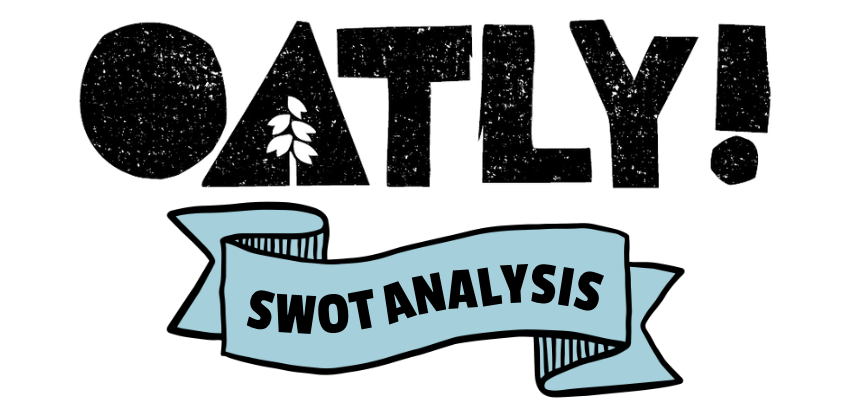
STRENGTHS:
- Strong Brand Identity: Oatly has established a strong and unique identity characterized by its branding and marketing elements, personality, tone and sustainable mission, making it easily recognizable in the market worldwide.
- Commitment to Sustainable Practices: Oatly’s mission is to “always deliver products that have maximum nutrition and minimal environmental impact,” and the company heavily focuses on its sustainable efforts (Oatly, n.d.). Oat milk production is significantly better for the environment than cow’s milk, which appeals to consumers who want to make a difference through their diet.
- Product Innovation: Consistently developing new products beyond oat milk allows Oatly to be present in multiple markets within the grocery industry. Other Oatly products include creamer, frozen desserts and cream cheese.
WEAKNESSES:
- Pricing: Oatly’s products are often more expensive than competing oat milk brands and alternative plant-based milk options on the shelves. This higher price point may influence consumers to choose cheaper alternatives.
- Ingredients: Ingredients such as rapeseed oil and sugars deter some consumers from choosing Oatly over competing oat milk companies (Groundwater, 2021).
- Supply Chain: Disruptions in the supply chain due to factors such as cost of production and weather-related events, especially droughts, can lead to shortages or delays. Oat milk takes a significant amount of water to make. Therefore, if there are limited water resources, Oatly’s ability to meet consumer demand can be affected.
OPPORTUNITIES:
- Increased Interest in Dairy Alternatives: Many consumers have switched from dairy products to plant-based alternatives over the years due to increased awareness. According to a report on the oat milk market, oat milk sales have increased by 70%, and 44% of people 25-44 years old stated they switched to plant-based milk, including oat (Delvens, 2022).
- Increased Trust in Sustainable Brands: According to the Harvard Business Review, Gen Z and Millennial customers are 27% more likely to purchase when a brand has clear intentions to help the people and the planet (Reichheld et al., 2023). As consumer interest in supporting brands with sustainability efforts and purpose increases, Oatly can capitalize on its strong initiatives.
- Gap in the Market: There is currently a lack of oat-based cheese in the plant-based market, and there are no known competitors, creating an opportunity to develop the first of its kind.
THREATS:
- Competition: The plant-based industry is consistently growing with increased consumer interest, making the oat milk market highly competitive. Emerging competitors threaten the brand’s current position.
- Food Labeling Regulations: Evolving food labeling regulations threaten Oatly, especially considering the company’s past negligence and previous lawsuits (Galen, 2020).
- Restricted Advertising: Past controversies involving misleading environmental claims have led to advertising restrictions in the UK (Sweney, 2022). These restrictions limit the ability to promote products effectively and can negatively impact brand perception.
*All content is for academic purposes only and in no way affiliated with Oatly*